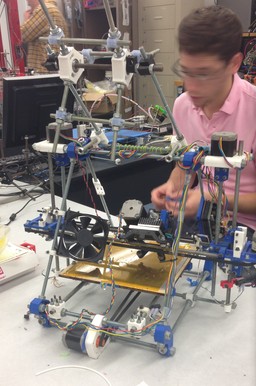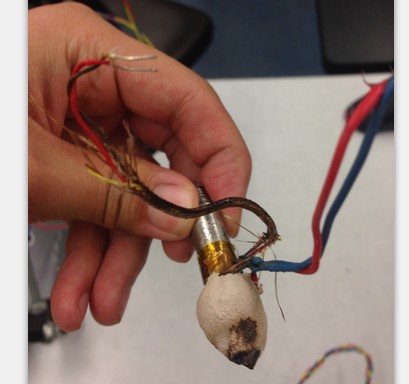User:Bestyiever
Contents
Self-introduction
Hello, My name is Yi Liu and I'm a senior at Penn state majoring in Industrial engineering.
I start to build things by myself when I was very young. Started from an electronic ring-bell and now to a
ring-bell software. To me, 3D printers are just amazing, the best tool to turn imagines in your mind to actual objects, not
only because it's the easiest way but also the most efficient way. The even better news is, this tool self-replicating.
Post one
This is the machine that we need to fix
 After trouble shotting,we figured that the major problem is the Extruder so we need to fix it.
After trouble shotting,we figured that the major problem is the Extruder so we need to fix it.
 We cracked heat isolated cement down and re wire the wire.
We cracked heat isolated cement down and re wire the wire.
 However, even we try this second time, the temp of the extruder still wont show up, so we decide to replace it with a new one.
However, even we try this second time, the temp of the extruder still wont show up, so we decide to replace it with a new one.
Post two
another problem shows Up, After we replace the old extruder with a new one, we figured that the new one require a different tray to hold it. Our team generate two solution for this, either make a completely new tray for this new Extruder or use screws to stable the tray for new extruder. https://www.youtube.com/watch?v=0HbiFO_4Ces&feature=youtu.be This is the video that the old extruder burns
Post three
Print a house. Concrete blocks were invented in the 1830s, we have been print house almost two hundred years. By that I mean we were the computer and we use our hand to
print concrete blocks and assemble that in to a full house. Right now, its time for computer to take over the job.
Below are the orginal news
World’s First 3D Printed Castle is Complete – Andrey Rudenko Now to Print a Full-size House
When building a home, there are usually two choices for building materials; wood and/or concrete block. The construction industry has been using these building blocks for centuries when constructing homes. Concrete blocks were invented in the 1830s and widespread use of them in the construction of homes really began taking off in the early 1900s. Wood framing is still the most commonly used technique in building homes today, as it is affordable, and lighter in weight than its counterpart. When you come to think about it, these methods for building homes date back, not only centuries, but millennia. While modern day construction materials and techniques may have changed a little bit, even the Ancient Romans, and Greeks used a form of concrete block in the construction of buildings.
One man, who we have been following for several months now, wants to change the methodology of home construction. Andrey Rudenko wants to provide another option to those looking to build homes. That option is 3D printing.
I first reported on Rudenko back in April, when we learned of his plans to 3D print a 2-story home in Minnesota, using a machine that could print in layers of concrete. He had planned on initially proving his concept by first 3D printing a small castle. It was a way for him to not only prove to the world that it was possible, but also for him to learn exactly what works, and what needs improvement in the process. In July, Rudenko sent us some photos of the progress that he had made on the castle. Not yet complete, you could tell that it was taking shape, and it appeared as though it would be a very successful project.
Now a little under a month later, we learn that Andrey Rudenko’s 3D printed castle has been completed, and for those who didn’t think it could be done, they have been proven wrong. Not only did Rudenko succeed in creating a 3D printed 4-sided building, but he did it with flare and style.
“It has been two years since I first began toying with the idea of a 3D printer that was capable of constructing homes,” said Rudenko. “While testing the printer, I ran into obstacles (such as the nightmare of the extruder clogging) and discovered even further abilities of the printer, like that it can print much more than 50cm a day as I originally thought. I was able to calibrate the machine so that it prints nearly perfect layers now, and I played with various heights and widths of the cement layers.”
Rudenko’s 3D printer prints layers of concrete that measure only 10 millimeters in height by 30 millimeters in width. The detail and perfection shown in each individual layer is extraordinary when compared to other 3D concrete printers that we have seen. Layer after layer, you see nothing but a smooth consistent surface that actually is quite appealing to the eye.
“When I started out, people struggled to believe this project would progress any further,” explained Rudenko. “However, I was lucky to get lots of invaluable input and support from individuals from the RepRap community. Specifically, I am eternally grateful to James Newton for his constant support with the drivers.”
newcastle5Rudenko also had a lot of help from other individuals, including a man named Mikhail Tikh who is a design engineer who provided him with a lot of solid information, and was the one responsible for creating the 3D model of the castle.
Rudenko is now moving on to begin 3D printing a house. Originally planned to be in Minnesota, he now believes that it may be best to find a location that provides a warmer climate, as the winters in Minnesota would be too harsh on the construction process and on the 3D printer itself. The material used in the printing process needs a warm climate, so that it has ample time to dry, and that is something Minnesota winters certainly won’t provide.
Right now, I am in the process of redesigning the printer based on the lessons learned,” said Rudenko. “My biggest priority is ensuring that the upgraded printer will be ready for the new project. My goal will be to print 24 hours a day until the project is finished. I’m also planning to print the structure in one piece; printing the castle turrets by themselves was a bad idea as they were extremely difficult to lift and place. I am open to offers from individuals or companies interested in owning the first house of this type built with the newest 3D technology and ready to provide abundant funds to completely cover the project and all its expenses”
newcastle3Rudenko is asking anyone interested in helping him out with the 3D printed house project to contact him via email. Another obstacle that he needs to overcome is that of finding a location where the local permitting committee would approve construction of such a 3D printed home. “A new era of architecture is inevitable, and I’m excited to see where the next few years will lead in terms of construction and design,” he said. “I have previously been sure I could print homes, but having finished the castle, I now have proof that the technology is ready.”
One thing he has learned in the process of printing the castle, is that the only defects that were seen, all happened in the process of stopping and starting the print process. Because of this, Rudenko plans on printing the house 24 hours a day, 7 days a week, until complete. Another thing that he would have done differently would have been to 3D print the castle’s turrets in one piece as part of the entire structure. The individual pieces were very heavy to lift, taking 7 men to get the job done, and caused a lot of problems in the process. When 3D printing the house, he plans to print the entire thing in one piece, including the roof.
There is no debate that this is the first 3D printed castle every created. The results are quite breathtaking, and I personally have no doubts that Rudenko will be successful in the 3D printing of a full size home. It should be interesting to see if Rudenko can get his house printed prior to architect Adam Kushner who we reported is planning to 3D print an entire estate in New York, including a 2400 square foot home and swimming pool, early next year. Let us know what you think of this incredible project in the 3D House Printer Forum thread on 3DPB.com. Check out some additional photos provided to us by Rudenko below.
Post four
as the extruder problem still exist, we lost the connection between the main chip board and computer. When we try to reboot it, the smoke come out and the control chip for X ax burned.
After exam the board, we figured couple ways to know is this board or not. We refresh the board by using marlin and try to replug it only again to see if it is still working, However, the wired red light is still on and there is still no connection between the board and computer.
Post Five
"3d Printing, clothes & Sensors : for US soldiers"
After reading this lots of thought pump out of my mind, It reminds me mobile phone was designed during the war time by Motorola cause US army need a easy carry communicate device. From one end, these new technology and device really helped soldiers,on the other hand,military really pushed technology forward.
Imagine how necessary 3D print is for military, All the weapons, cloths, vehicles etc, During the war time everything is consumable. Thus, supply on time always means the victory. 3D print just fit in the role. every thing pre designed and coded, when ever needed its over there.
Another point is , this also can lower the cost of war(thoughts wired). After gulf war,lots of weapon and vehicles are just left over there cause the cost of moving them back to us is even higher then rebuilt them, If all these staff are printed, they may be reusable.
Post Six
"NASA Is Building the World's First 3D-Printed Satellite Camera"
After reading this, my mind was blowed. Space travle is no longer a dream. If Nasa will be able to build the World's First 3D-Printed Satellite Camera that also means they can and will build everything with 3D printer.
There were lots of problems for space travle
for example Space Junk
Space craft may damage any time by hit of Space junk. If we got a 3d printer on site and all parts files loaded, no problem.
Further more, why dont we built a space ship that it self is a 3D printer. Sounds easy, a REPRAP with racket. Yes, why not. It can generat the part of it self more like healing and assembled directly to itself if any part is damaged.
Reliability
3d print may also lead us to another route for space craft materials, more reliable and reuseable.


